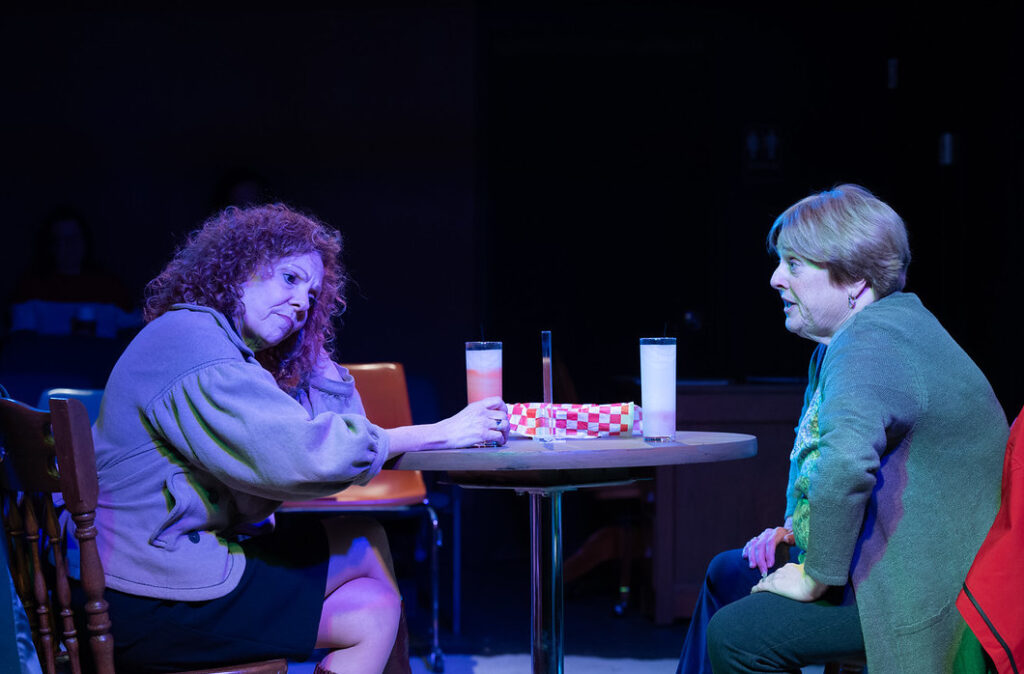
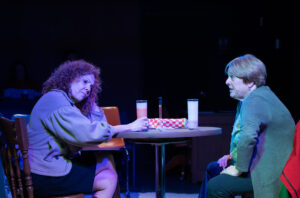 ***** A Provocative Reflection on Morality, Identity, and Obsession, Eric Gernons’ world-premiere play, “The Totality of All Things”, directed by Enrico Spada, is a gripping exploration of morality, identity, and the fraught boundaries between conviction and obsession. Staged at the intimate Redtwist Theatre in Chicago, this production captivates audiences with its unflinching portrayal of ethical dilemmas within a high school microcosm. Anchored by six richly developed characters, the play takes viewers on a compelling journey that resonates well beyond its 90-minute runtime.
***** A Provocative Reflection on Morality, Identity, and Obsession, Eric Gernons’ world-premiere play, “The Totality of All Things”, directed by Enrico Spada, is a gripping exploration of morality, identity, and the fraught boundaries between conviction and obsession. Staged at the intimate Redtwist Theatre in Chicago, this production captivates audiences with its unflinching portrayal of ethical dilemmas within a high school microcosm. Anchored by six richly developed characters, the play takes viewers on a compelling journey that resonates well beyond its 90-minute runtime.
The narrative revolves around Judith, portrayed with striking intensity by Jacqueline Grandt. A stern, sarcastic journalism teacher renowned for producing award-winning student papers, Judith is the heart of the play. Her uncompromising belief in truth and moral clarity places her at the center of a controversy when her Gay Pride Month display, celebrating LGBTQ+ accomplishments, is defaced with a swastika. Judith’s response to this act of vandalism drives the drama, as her steadfast ideals morph into an obsessive quest for justice.
Judith’s relationships with the other characters provide a textured framework for the story. Mical played by Kason Chesky, is a nervous and awkward student who dreams of becoming a journalist, has come out only to Judith. Played with remarkable vulnerability, Mical represents the stakes of the play’s central conflict: the need for safe spaces where identity can be embraced without fear. When the board is defaced, Mical’s trust in Judith is tested as her righteous anger spirals into actions that risk harming those she aims to protect.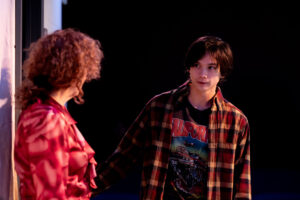
Judith’s closest ally and friend, DeeAnn, played by Suzy Krueckeberg is a history teacher brought to life with warmth and humor. DeeAnn’s religious but moderate worldview contrasts sharply with Judith’s black-and-white perspective. Despite her bubbly personality and unwavering support for Judith over two decades, DeeAnn becomes a casualty of Judith’s growing obsession. This tension between personal loyalty and ethical disagreement is one of the play’s most poignant themes, demonstrating how deep relationships can fracture under the strain of ideological rigidity.
The supporting characters add further complexity to the story. Philip Mathews delivers a standout performance as the math teacher and Judith’s confidant. His attempts to mediate and support Judith reflect a compassionate yet pragmatic perspective, illustrating the challenges of balancing personal conviction with broader community dynamics. Meanwhile, the school principal, Mr. Benson (played by Phil Amen), provides a nuanced foil to Judith. As her ex-husband, his concern for her well-being is palpable, but his pragmatic approach—urging Judith to avoid media attention and police involvement—positions him as a voice of reason. This dynamic offers a layered exploration of their past relationship and diverging philosophies.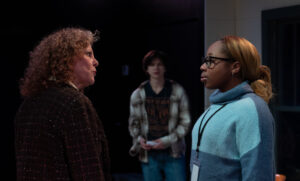
Aundria Tranay’s portrayal of Ms. Carter, a student teacher navigating her first assignment, brings a refreshing vulnerability to the production. Carter’s awkward attempts to connect with her colleagues and students make her a relatable figure, but her ultimate decision to distance herself from Judith underscores the limits of ideological solidarity. Her character arc highlights the fine line between standing for one’s beliefs and enabling harmful behavior.
Enrico Spada’s direction ensures that the play remains tightly paced and emotionally engaging. Despite the confines of a small storefront theater, Spada’s staging transforms the space into a vivid school environment, immersing the audience in the action. The seamless transitions and attention to detail, facilitated by stage manager Taylor Mercado Owen, enhance the play’s realism. The audience becomes part of the classroom, heightening the tension and emotional impact of the story.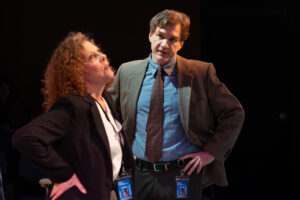
Gernons’ script is masterful in its exploration of contemporary issues such as identity, prejudice, and the potential for even noble intentions to veer into harmful territory. The play does not provide easy answers, instead inviting audiences to grapple with its themes long after the final curtain. Judith’s descent from principled determination to destructive obsession serves as a cautionary tale about the dangers of losing sight of humanity in the pursuit of justice.
The performances in “The Totality of All Things” are uniformly excellent, with each actor bringing depth and authenticity to their roles. Jacqueline Grandt’s portrayal of Judith is particularly compelling, as she captures both the character’s righteous passion and her tragic flaws. The chemistry among the cast members reinforces the sense of a tightly knit yet fractious community, making the conflicts feel all the more real.
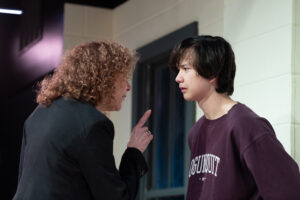 This production is a must-see for theatergoers interested in thought-provoking drama. With its combination of incisive writing, stellar performances, and intimate staging, The Totality of All Things is both a powerful piece of storytelling and a mirror reflecting the complexities of our time. The play’s run at Redtwist Theatre continues through December 21st, with a brief hiatus before resuming in January. With accessible ticket pricing, General Admission is $35.00, Seniors and Military $15.00 and students are $10.00. including pay-what-you-can Fridays.
This production is a must-see for theatergoers interested in thought-provoking drama. With its combination of incisive writing, stellar performances, and intimate staging, The Totality of All Things is both a powerful piece of storytelling and a mirror reflecting the complexities of our time. The play’s run at Redtwist Theatre continues through December 21st, with a brief hiatus before resuming in January. With accessible ticket pricing, General Admission is $35.00, Seniors and Military $15.00 and students are $10.00. including pay-what-you-can Fridays.
Redtwist Theatre is located at 1044 W. Bryn Mawr Ave, Chicago. With ample street parking. Tickets can be bought on line at , www.Redtwisttheatre.org
For those seeking a theater experience that challenges, provokes, and lingers in the mind, The Totality of All Things delivers in every respect.
To see what others are saying, visit www.theatreinchicago.com, go to Review Round-Up and click at “The Totality of all Things”.






More Stories
“The Firebugs” reviewed by Julia W. Rath
“The Book of Grace” Al Bresloff with another from Paul LIsnek
“The Last Five Years” MILWAUKEE